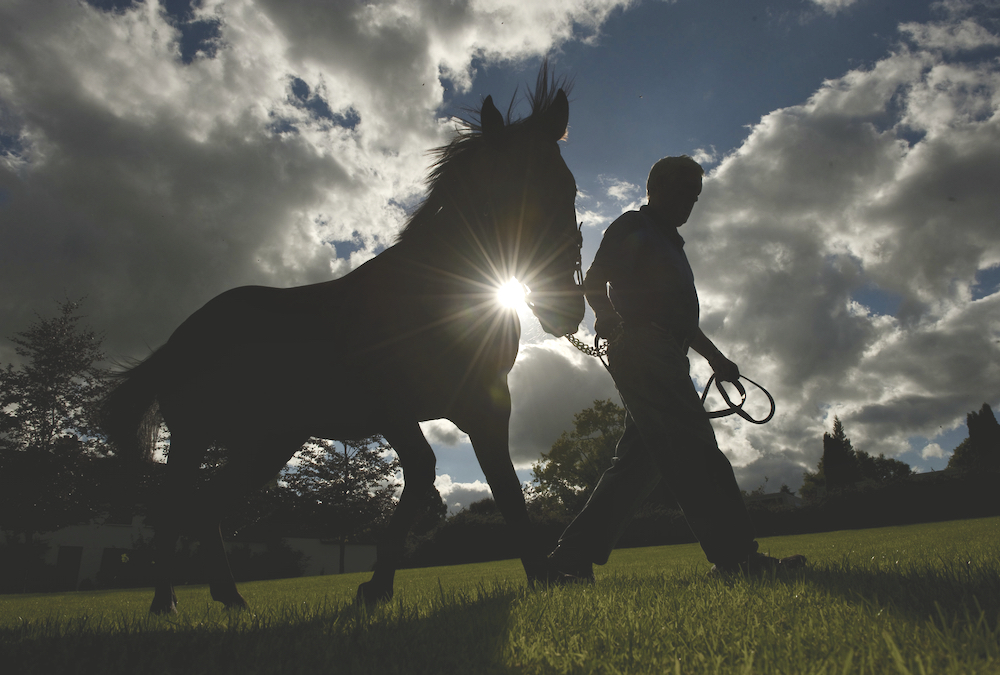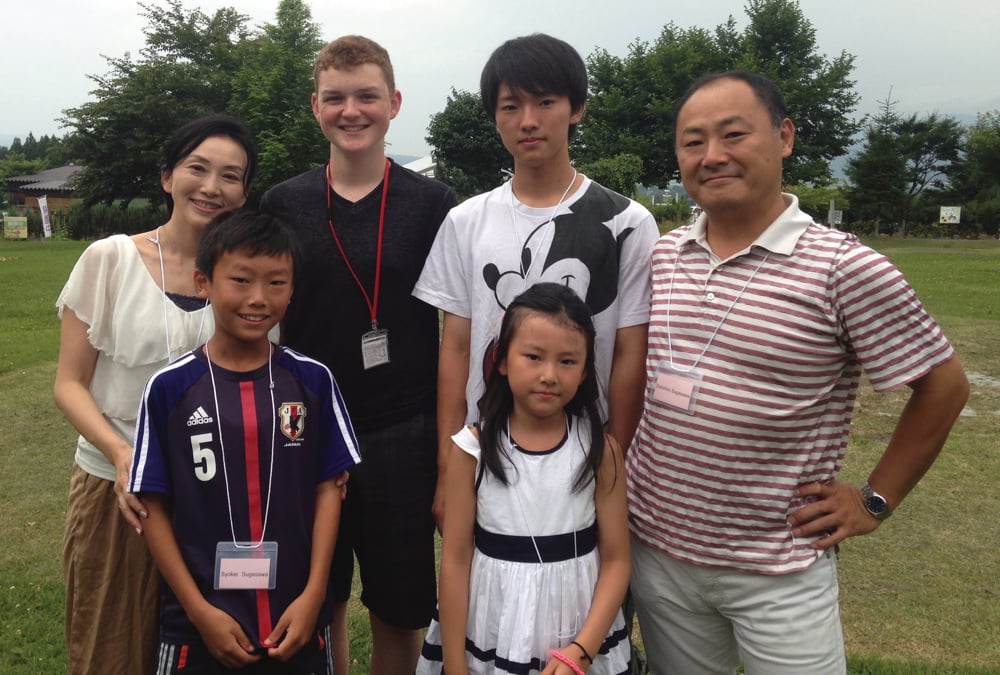Travel changes a farmer, sometimes much more than anyone could have expected
Seeing different ways of farming and working can work a miracle for a farmer. So can experiencing different cuisines and cultures, learning new travel skills, and expanding their networks and friendships.
Sometimes, too, the changes go even deeper.
Read Also

Lessons from the past: How Canada can reverse its shrinking share of the global food market
A historic look back at how Canada has positively dealt with trade issues — and how those lessons can inform future moves.
Cheryl Hazenburg, a 2014 Nuffield Canada scholar, travelled through Europe investigating her topic of traceability in the beef sector. One of her stops included Ireland where she was able to catch up with some fellow Nuffielders.
It was just luck that Irish dairy farmer Kenneth Bray was a friend of those Nuffielders. Then, through the power of social media, he and Cheryl began connecting. Fast-forward a couple of years and now they both call Ireland home, living on Kenneth’s family farm in Westmeath, Ireland, with their two -month-old daughter Keelin.
Similarly, but on a storyline of their own, Kristina Polziehn fell in love with Aussie scholar Glenn Wormald on a six-week around-the-world tour.
Kristina and Glenn had met at the international scholars conference in Brazil in March 2017. After the conference, both joined an Australian-led Global Focus tour for a six-week around-the-world marathon visiting farms, businesses, other scholars, dignitaries and more in a packed schedule.
It was the kind of travel where you either thrive on the contact with your fellow travellers, or you find yourself sometimes seeking some quiet time alone. Glenn and Kristina, as you’ll see in a minute, found love.

Now the couple live near Edmonton while Kristina pursues a PhD in crop modelling for canola, as well as continuing with her crop consulting business Axiom Agronomy. With three kids under four years old, including two-year-old twin boys, Glenn is currently managing the home-front, giving up his career in the Australian aquaculture industry to support Kristina’s work.
Cheryl and Kenneth are active agricultural leaders. Cheryl remains involved with Nuffield Canada, and is also a member of the Global Farmers’ Network. Kenneth is County Chair of the Irish Farmers’ Association and sits on the National Liquid Milk Committee, which negotiates annual milk contracts.
Kenneth says he was born to be a farmer and was into cows as soon as he was old enough to milk. Today he is the eighth generation to farm the same land.
Cheryl was deeply rooted too, growing up on her family’s beef farm in Ontario. Her career has revolved around working for breed organizations, something she continues in Ireland with her job as breed secretary of the Irish Shorthorn Society. Together they run the dairy farm milking about 70 head on 40 ha (100 acres) seasonally.
Currently the cows calve in two blocks in spring and fall, but will be switched to only fall calving this year. With most dairy farmers concentrating on spring calving, there is a shortage of liquid milk in December through February, a market they can now serve.
Moving to fall calving will only benefit the family too, says Cheryl. “We’re both new parents and we want to take a step back to have more family time. Calving once a year also means that the cows will be dry for the month of August which will make us able to come home to Canada for a couple of weeks, as we won’t have the work, and Keelin will be off of school. That’s something we’re looking forward to.”
What have they learned in their moves across oceans
Both couples say that marrying someone from abroad has brought both challenges and opportunities.
Cheryl and Kenneth also see the unique skills they gained from marrying abroad. Kenneth credits Cheryl for helping him move to a stricter culling system for unproductive or infertile cows and for helping him take a deeper look at how the farm could boost its profitability.
“Cheryl has driven profitability home to me and that unproductive cows must go as soon as possible. I used to carry cows longer than I should have. She’s got me thinking differently. When we were first married, we were farming a bit more land, and Cheryl questioned why. We sat down, did the figures and she was right, so we dropped it. We’ve also shrunk cow numbers slightly, but we’re more profitable.”
Kenneth also learned the need for farm diversification, so now they have some beef cattle and sell pasture-raised meat. Cheryl has also encouraged Kenneth to change from a ryegrass- and clover-based pasture crop to a multi-species one, and dropped annual tillage work. She also brought her “Canadian snow skills” which were highly useful during a massive snow storm in 2018.
Cheryl jokes, “I brought the ability to thaw water lines with my hair dryer!”
From Cheryl’s perspective, farming in Ireland is completely different and she’s learning a lot about grass and forage management. Almost everything is pasture-based with low costs and seasonal calving. She relates the system to more of a New Zealand style where farmers have to be as efficient as possible as they have to sell milk based on world prices.
The biggest advantage she notes is the country’s ability to grow grass. It’s common to see pastures being grazed for 40 or more years, although she says the level of fertilizer used is much greater than she was used to. She hopes moving to multi-species forages will help lower these costs.
“It’s a completely different way of farming here. I’m still wrapping my head around it and don’t fully understand it. In terms of grass management stuff, there are similarities but there’s so many differences in terms of managing the grass to get the most out of it, and keeping our costs so much lower than our system at home. You think that you know farming when you’ve been in it your whole life and then you come over here and have no idea how to even function here. I’m relearning everything.”
Cheryl also notes the stringent farming rules set down by the European Union around environmental protection. Farmers are limited in the amount of nitrogen that can be applied annually, they must adopt low-emission slurry methods and avoid applications between October and January.
Nor can they fence waterways, and they are banned from annual hedge cutting.
“The regulations just keep getting harder and harder,” Kenneth says. “One starts questioning how much longer we can actually go on. There is also a very big anti-dairy farm movement in this country that is determined to shut us down or take us back 40 or 50 years. According to this movement, farming is the reason behind climate change here. They have a very strong lobby at the European level as well and, and can get laws passed.”
While the regulations are getting stricter, Cheryl also sees the benefits of the EU. In 2018, her first year of farming in Ireland there was a drought, and where we in Canada would have cut cow numbers, Irish farmers just asked the EU for more money to buy feed. “It just kind of blew my mind that here farmers just looked for more government handouts,” she says.
They both know though that those payments are dwindling as the EU reprioritizes its spending.
In Canada, meanwhile, Kristina says Glenn has brought new perspectives to her as well.
“We do talk a lot about different productions systems. Glen is a problem-solver and a technical thinker. While shrimp farming differs a lot to my work with canola, in the end we’re both trying to achieve the same thing, increased production through better management. My clients are large operations. Some farm 20 to 30,000 acres. I would say they are top farm managers, but they look to me to help tweak things or to talk through ideas.”
“Glenn has dealt more with teams than I have, so his skills with groups and training are helping me aid farmers working through succession issues and to do some mentoring of younger farmers. Coaching and helping with team building is becoming more a part of my job as an agronomist.”
As for Glenn, he credits Kristina for bringing an academic perspective to his thinking. “Coming in with little experience of academia, I had an opinion that professors and researchers were a bit frosty, and very politically correct. Now I see the way they think is just them breaking things down with a different logic.
“I’m a problem-solver. I look for solutions and work to ensure that the problem doesn’t happen again. So I have a very sort of closeup view of what happens in my world, where in Kristina’s, she works with numbers. She sees the matrix.”
Kristina also loves the fact that the kids have dual citizenship. “They have a great opportunity to experience the world … That’s the part that excites me as a parent. We’ve just given them this huge golden opportunity. They can even do their education in either country.”
Glenn is enjoying the Canadian experience, although maybe not the snow since part of the reason he got into shrimp farming was because it took place in a tropical environment.
What does the future hold
For Kenneth and Cheryl the goal is to keep making their farm more profitable, which includes breeding goals including the introduction of Jersey/Holstein crosses to make the cows smaller.
“We’d like to get to a situation where we produce 90 to 100 per cent of the cow’s body weight in milk solids,” Cheryl says.
They are also looking to decrease the amount of feed (grain, pellets and some silage) they need to buy with the goal of producing 90 to 95 per cent of their own.
Kristina and Glenn will remain in Edmonton; Kristina’s PhD will take another three to four years to complete. Kristina hopes that Glenn can build his own consulting business in the aquaculture industry, but for right now finding a work-life balance is the key.
“It would be a bit of a shame to not be able to utilize his kind of experience with developing and implementing performance protocols and quality control,” she says. “Ultimately, my goal would be for us to have a life that we can share in both countries.
“We have looked into getting into the developing shrimp industry here and we put together some business plans … That was before the twins arrived though!”















